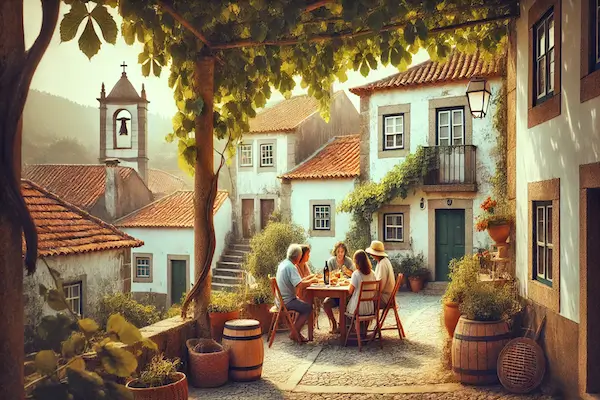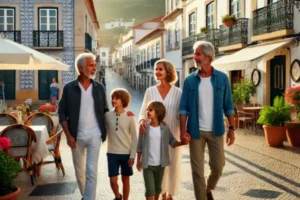Moving to Portugal with your family often comes with a dream of finding not just a new home but a new way of life. For many expats, the quaint villages scattered across Portugal offer the perfect backdrop for a fresh start—affordable homes, breathtaking landscapes, and a lifestyle that invites you to slow down and truly savor each day.
These serene communities offer more than just a picturesque setting. They embody a pace of life where neighbors know your name, kids play safely in the streets, and local traditions weave a sense of belonging. For families seeking a balance between affordability and quality of life, these villages present a rare opportunity to build roots in a simpler, more fulfilling way.
In this article, we’ll explore the unique rhythm of daily life in Portugal’s villages, offer practical tips for adapting as an expat family, and uncover the many rewards of settling into a slower-paced lifestyle. Whether you’re searching for a budget-friendly home or a meaningful change, Portugal’s villages might just hold the key to your next chapter.
Why Choose Portugal’s Villages for Family Life?
Relocating to a new country is a big step, especially with a family in tow. For expats, Portugal’s charming villages offer a unique blend of affordability, safety, and a deep sense of community—ideal for families seeking a fresh start. Here, you’ll find a lifestyle centered on family values, authenticity, and a slower pace that allows you to reconnect with what matters most.
Portugal’s Family-Friendly Culture
Portugal is renowned for its welcoming attitude toward families. In villages, this warmth is even more pronounced:
- Strong Community Bonds: Village life thrives on close-knit relationships, where neighbors look out for one another, creating a safe and nurturing environment for kids.
- Family-Oriented Traditions: Local festivals, Sunday lunches, and seasonal celebrations are all centered on bringing people together, making it easy for newcomers to feel at home.
- Child-Friendly Attitudes: Restaurants, public spaces, and even local events are accommodating to children, reflecting Portugal’s strong cultural emphasis on family.
The Appeal of Smaller Villages
Living in a Portuguese village offers advantages that city life often can’t match, especially for families looking to prioritize safety, affordability, and authenticity.
- Safety First: Villages often have lower crime rates than urban areas, allowing children to play freely and parents to enjoy peace of mind.
- A Tight-Knit Community: Life in a small village fosters relationships that go beyond just being neighbors. Expect to exchange morning greetings at the café, share garden produce, and be invited to local festas.
- Authentic Living: Unlike bustling tourist hubs, villages offer a chance to experience traditional Portuguese culture, from age-old culinary practices to the slower pace of daily life.
Cost of Living: Villages vs. Urban Areas
One of the biggest draws for families is the significant cost savings when choosing village life over the city:
- Affordable Housing: Village homes often cost a fraction of what you’d pay in Lisbon or Porto. Whether renting or buying, your budget stretches further in rural areas.
- Lower Daily Expenses: From fresh produce at local markets to reduced utility costs, everyday living is more budget-friendly in villages.
- Less Temptation to Overspend: With fewer commercial distractions, families often find themselves spending less and saving more in village settings.
Key Villages to Consider
Portugal is dotted with picturesque villages, each with its own unique charm. Here are a few top picks for expat families:
- Monsanto: Known as the “most Portuguese village in Portugal,” Monsanto is perched on a hilltop with granite homes that blend seamlessly into the landscape. It’s perfect for those who want a quiet life steeped in history.
- Óbidos: A medieval village surrounded by castle walls, Óbidos offers excellent accessibility to Lisbon while retaining its old-world charm. It’s ideal for families who value proximity to the city without the urban rush.
- Aljezur: Nestled in the Algarve region, Aljezur is known for its stunning natural beauty and laid-back atmosphere. Families who enjoy outdoor adventures and beach life will feel at home here.
- Piódão: A hidden gem in the Serra do Açor mountains, Piódão’s schist houses and cobblestone streets make it a magical retreat. Its remoteness offers tranquility, ideal for those who value privacy and seclusion.
Each of these villages offers something special, whether it’s affordability, history, or breathtaking scenery. Choosing the right one for your family depends on your lifestyle and priorities.
Living in a Portuguese village isn’t just about finding a cheaper home; it’s about embracing a lifestyle that prioritizes connection, community, and authenticity. In the next section, we’ll dive into what daily life looks like in these idyllic settings and how your family can adapt to the change.
The Slower Pace: What to Expect
Moving to a Portuguese village means stepping into a world where time feels less rushed, and the little things in life take center stage. Unlike the hustle of urban environments, the daily rhythms in these communities revolve around connection, tradition, and living in the moment. For families, this slower pace can be a refreshing change, fostering deeper bonds and a stronger sense of well-being.
Daily Rhythms in Portuguese Villages
Life in a Portuguese village is governed by simplicity and routine. Here’s what you can expect:
- Mornings at the Café: The day often starts with a leisurely coffee and pastel de nata at the local café. It’s a time to greet neighbors and catch up on village news.
- Quiet Afternoons: Midday is for long, relaxed lunches, often followed by a siesta or quiet time, especially in the summer. Shops may close temporarily, encouraging everyone to pause and recharge.
- Evenings Outdoors: As the day cools down, families gather in the village square or garden spaces. Children play freely while adults enjoy casual conversations, often stretching late into the evening.
Traditions that Foster Connection
Villages in Portugal are deeply rooted in traditions that celebrate community and togetherness. These moments are opportunities to connect, unwind, and embrace the slower lifestyle:
- Local Festas (Festivals): Every village has its own festas, often tied to religious or seasonal events. These celebrations bring everyone together with food, music, and dancing, creating memories for the entire family.
- Weekly Markets: Local markets are not just about shopping; they’re a social experience. Families can find fresh produce, handmade goods, and catch up with friends while supporting local farmers and artisans.
- Seasonal Activities: From grape harvests in the fall to olive picking in the winter, families can participate in time-honored agricultural practices that connect them to nature and the community.
The Role of Family Values in Village Life
Portuguese villages are deeply family-oriented, and this is reflected in every aspect of daily life:
- Multigenerational Living: It’s common to see multiple generations living close together or under the same roof, creating a strong support system for families.
- Prioritizing Relationships: In village culture, relationships come before schedules. Whether it’s a spontaneous visit from a neighbor or an extended family dinner, there’s always time for connection.
- Child-Friendly Environment: Kids are cherished members of the community, and their presence is celebrated in public spaces, festivals, and family gatherings. This focus on inclusivity ensures they grow up feeling safe and valued.
Living at a slower pace means embracing a lifestyle that prioritizes the things money can’t buy—family, community, and tradition. For families relocating to Portugal, these villages offer a chance to step back from the rush and enjoy a way of life that is as enriching as it is grounding.
Next, we’ll explore how expats can adapt to this lifestyle and make the most of their village experience.
Adapting to Village Life as an Expat Family
Moving to a Portuguese village offers countless rewards, but adapting to a new way of life takes some effort, especially for expat families. Successfully blending into the slower-paced, close-knit community requires learning the local customs, navigating practicalities like education and healthcare, and striking a balance between work and personal life. With some preparation, you can make the transition smoother and more rewarding for your entire family.
Cultural Integration
To truly feel at home, it’s important to embrace the local culture and connect with your community.
- Learning Portuguese: While many locals speak some English, especially younger generations, learning Portuguese will open up opportunities to bond with neighbors and participate in community life. Start with basic phrases and consider enrolling in language classes offered in nearby towns or online.
- Building Relationships: Villages are known for their tight-knit communities, so don’t be shy about introducing yourself. Attend local festas, visit the weekly markets, and join activities like gardening groups or parent associations at your child’s school to build rapport with your neighbors.
- Respecting Traditions: Villages often have unique customs and unwritten rules. Take the time to observe and ask questions—it’s a great way to show respect and curiosity while deepening your cultural understanding.
Educational Opportunities
Finding the right schooling option for your children is essential for their adaptation and happiness.
- Local Schools: Most villages have primary schools that provide a welcoming environment for young children. While the curriculum is in Portuguese, children often adapt quickly with support from teachers and peers. Secondary education may require travel to a nearby town.
- Private or International Schools: If you prefer English-based education, there are private or international schools in larger towns or cities, though this may require a daily commute or relocating closer to these institutions.
- Homeschooling Options: Portugal allows homeschooling, and some expat families choose this route to balance education with cultural immersion. There are online resources and expat networks that can help you get started.
Health and Wellness
Portugal’s healthcare system is accessible and of high quality, even in rural areas. Here’s what you need to know:
- Public Healthcare: Residents have access to the national healthcare system (SNS), which provides affordable care. Most villages have health centers for basic needs, while specialized care may require travel to larger towns.
- Private Clinics: For faster or more specialized services, private clinics are an option. Many expats choose to combine public and private healthcare for flexibility.
- Wellness Activities: Village life encourages healthy living, from fresh local food to outdoor activities. Explore hiking trails, join yoga classes, or simply enjoy nature with your family.
Work-Life Balance
For expat families, balancing work and family life is key to thriving in a village environment.
- Remote Work Opportunities: Many expats take advantage of Portugal’s strong internet connectivity and lower cost of living to work remotely. Be sure to check for stable internet access before choosing a home in a remote village.
- Local Employment: While job opportunities in villages may be limited, there are roles in agriculture, hospitality, and small businesses. For those with entrepreneurial spirit, starting a local venture, like a guesthouse or café, can be a fulfilling option.
- Family Time: The slower pace of village life naturally supports work-life balance. With shorter commutes and fewer distractions, you’ll find more time to spend with your loved ones.
Adapting to life in a Portuguese village as an expat family requires patience, curiosity, and a willingness to embrace change. By learning the language, understanding local customs, and planning for practical needs like education and healthcare, you can ensure a smooth transition and enjoy all the benefits of this idyllic lifestyle.
Practical Tips for Settling Down
Starting a new life in a Portuguese village is an exciting journey, but it comes with its own set of challenges. From finding the perfect home to navigating local bureaucracy and building a support network, preparation and patience are key. Here’s how you can make the transition smoother for your family.
Finding a Home: Renting vs. Buying in a Village
Choosing the right home is one of the most important decisions for any expat family.
- Renting First: If you’re new to Portugal or unsure about the specific village, renting is a great way to test the waters. Rental costs in villages are often much lower than in cities, and many homes come with charming features like gardens or courtyards.
- Tip: Use local real estate agents or expat forums to find rental listings. Websites like Idealista or OLX can also be helpful.
- Buying a Home: For families planning to settle long-term, buying offers stability and the chance to truly make the house your own. Village homes are typically more affordable, but some may require renovations.
- Tip: Consult a local lawyer to navigate the property-buying process and ensure all paperwork is in order.
- Hidden Gems: Look out for traditional stone houses, often sold at bargain prices. They may need work, but they’re full of character and can become a dream family home.
Navigating Local Bureaucracy
Like any move abroad, settling in Portugal involves some administrative tasks. Here’s how to stay on top of them:
- Registering Your Family: Once you arrive, you’ll need to apply for residency permits for each family member. The local Câmara Municipal (town hall) is a good starting point for guidance.
- Tip: Bring all necessary documents, including proof of address, marriage certificates, and birth certificates for children.
- Setting Up Utilities: Water, electricity, and internet are essentials you’ll need to arrange for your home. Utility companies vary by region, so ask locals or your landlord for recommendations.
- Tip: Portugal’s internet services are generally reliable, but some remote villages may have limited options. Consider this when choosing a home.
- Tax and Healthcare Registration: Once you have residency, register for a NIF (tax number) and sign up for the public healthcare system (SNS). Both are crucial for accessing services and managing finances.
Building a Support Network
Adjusting to village life is easier when you have a support system. Here’s how to connect with others and integrate into the community:
- Engaging with Local Groups: Many villages have community centers, parent associations, or clubs where you can meet locals and expats. Joining these groups is a great way to get involved and feel at home.
- Tip: Don’t hesitate to attend local events, even if you’re not fluent in Portuguese. Villagers often appreciate the effort to participate.
- Expat Networks: Look for online forums, Facebook groups, or local meetups tailored to expats in Portugal. These networks can provide valuable advice, friendship, and a sense of belonging.
- Tip: Platforms like Internations or dedicated Portugal expat Facebook groups are great starting points.
- Becoming Part of the Community: Volunteering for local events, attending church services, or simply spending time in the village café can help you forge meaningful connections and make your family feel like part of the village fabric.
Settling down in a Portuguese village requires some effort, but the rewards are well worth it. By taking the time to find the right home, navigating the bureaucracy with care, and building a strong network, you’ll lay the foundation for a fulfilling life in your new community.
Benefits for Families in Portugal’s Villages
Settling in a Portuguese village offers more than just affordability—it’s an opportunity to transform your family’s quality of life. From health advantages to cultural enrichment and personal growth, village living brings a host of rewards that go beyond the material. Here’s how this lifestyle can positively impact your family.
Health Benefits of Rural Living
Village life naturally promotes well-being through its environment and lifestyle.
- Fresh Air and Nature: With less pollution and more access to green spaces, your family will benefit from cleaner air and a stronger connection to nature. Activities like hiking, gardening, or simply enjoying the quiet countryside can reduce stress and boost overall health.
- Organic, Local Food: Many villages have access to fresh, seasonal produce straight from local farmers or markets. Families often find themselves eating healthier and discovering the joy of simple, homemade meals.
- Stress-Free Living: The slower pace of village life encourages mindfulness and reduces the constant pressures of urban living. This can be particularly beneficial for parents balancing work and family life.
Opportunities for Children
Villages in Portugal are a haven for children, offering experiences that shape their development and create lifelong memories.
- Safe and Secure Environment: In villages, children often enjoy the freedom to play outside, explore nature, and walk to school without the same safety concerns found in larger cities.
- Cultural Immersion: Growing up in a village provides kids with unique cultural experiences, from participating in local festas to learning traditional crafts and customs. These experiences enrich their understanding of the world and foster a sense of community.
- Strong Social Connections: Smaller communities make it easier for children to build close friendships with peers and meaningful relationships with adults, fostering a strong support network as they grow.
Personal Growth for the Whole Family
Village living offers families a chance to reflect, reconnect, and grow in ways that urban life often doesn’t allow.
- Embracing Simplicity: Life in a Portuguese village encourages a focus on what truly matters—family, relationships, and enjoying the present moment. Many expats describe it as a chance to “slow down and breathe.”
- Learning New Skills: From language learning to gardening or even participating in local traditions like olive harvesting, village life is full of opportunities to step out of your comfort zone and grow as individuals and as a family.
- Stronger Family Bonds: Without the constant distractions of urban living, families in villages often find more time for each other. Whether it’s shared meals, weekend hikes, or helping with community events, these moments create lasting memories.
Living in a Portuguese village is about more than just affordability—it’s a lifestyle that prioritizes health, happiness, and connection. For families seeking a simpler, more fulfilling way of life, these benefits make village living a truly enriching choice.
Challenges to Prepare For
While life in a Portuguese village is rewarding, it comes with its own set of challenges. Being prepared for these adjustments can help your family transition more smoothly and avoid frustration. Here are some common obstacles expats face and practical tips to overcome them.
Limited Access to Amenities and Services
Village life often means fewer conveniences compared to urban areas, but with some planning, you can adapt.
- Fewer Shops and Services: Small villages may lack major supermarkets, specialized stores, or entertainment options. However, nearby towns usually offer what you need, and many villages host weekly markets for essentials and local goods.
- How to Manage: Plan your shopping trips in advance and explore online delivery services, which are increasingly available even in rural areas.
- Healthcare Accessibility: While basic healthcare is available in most villages, specialized services might require travel to larger towns or cities.
- How to Manage: Familiarize yourself with the nearest health center and emergency services. Consider supplemental private insurance for quicker access to specialists.
- Public Transport Limitations: Many villages have limited or no public transportation, making a car essential for families.
- How to Manage: Ensure your family has reliable transportation and consider carpooling with neighbors to cut costs or share resources.
Adjusting to a Different Pace of Life
The slower rhythm of village life can be a double-edged sword, especially for those used to the fast pace of cities.
- Patience is Key: Simple tasks, like setting up utilities or navigating local bureaucracy, might take longer than you’re accustomed to. Embrace the slower pace as part of the cultural charm.
- How to Manage: Approach delays with flexibility and a sense of humor. Building relationships with locals can also help you navigate processes more efficiently.
- Fewer Entertainment Options: Villages often lack the variety of entertainment found in cities, such as cinemas, shopping malls, or trendy cafes.
- How to Manage: Shift your mindset to enjoy simpler pleasures like nature walks, local events, or family game nights. Use nearby towns for occasional “big city” outings.
Overcoming Potential Language Barriers
While many locals are friendly and accommodating, English proficiency is less common in rural areas, especially among older generations.
- Learning the Basics: A lack of Portuguese skills can make initial interactions challenging, from asking for directions to setting up services.
- How to Manage: Dedicate time to learning key phrases and basic vocabulary. Apps, online courses, or local language schools can be excellent tools for beginners.
- Communicating with Locals: Building relationships might be slow at first if you’re not fluent in Portuguese, but effort goes a long way.
- How to Manage: Be patient, use translation apps when needed, and don’t be afraid to make mistakes—locals appreciate your effort to learn their language.
Relocating to a Portuguese village is not without its hurdles, but most challenges are manageable with the right mindset and preparation. Embracing these differences as part of the experience will help your family thrive in your new home. By anticipating these obstacles and adapting to the unique rhythm of village life, you’ll set the stage for a successful transition.
A life worth slowing down for
Adapting to life in a Portuguese village is more than just a move—it’s a chance to rediscover what truly matters. From the health benefits of rural living and the opportunities for children to the joys of embracing a slower, more intentional pace, village life offers a unique path to fulfillment. While challenges like limited amenities or language barriers may arise, they’re easily outweighed by the rewards of a close-knit community and an affordable, enriching lifestyle.
If you’re dreaming of a simpler, more meaningful way of living, taking that first step can be transformative. Explore the villages, immerse yourself in the culture, and prepare to embrace the change. Whether it’s renting a home, learning Portuguese, or connecting with expat networks, each step brings you closer to building the life you envision for your family.
We’d love to hear your thoughts! Share your questions, experiences, or dreams about life in Portugal’s villages in the comments below. Don’t forget to join our community for exclusive resources, tips, and inspiration to help you plan your move and settle into this idyllic way of life. Your family’s next chapter starts here—why not begin today?




